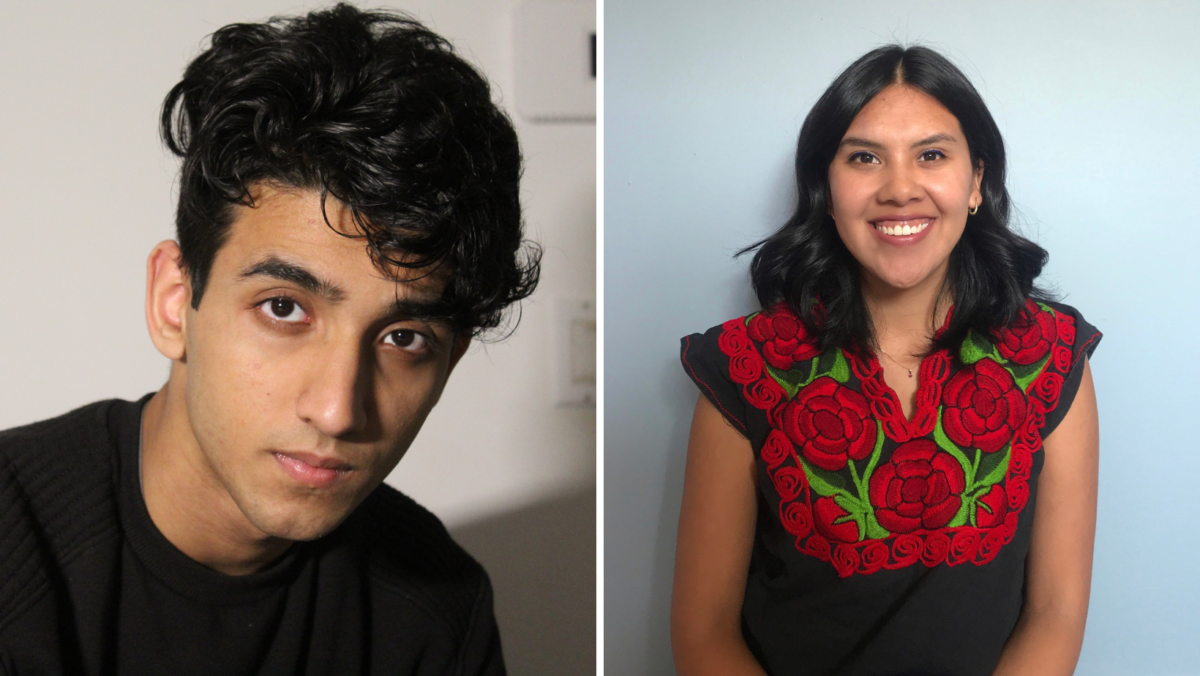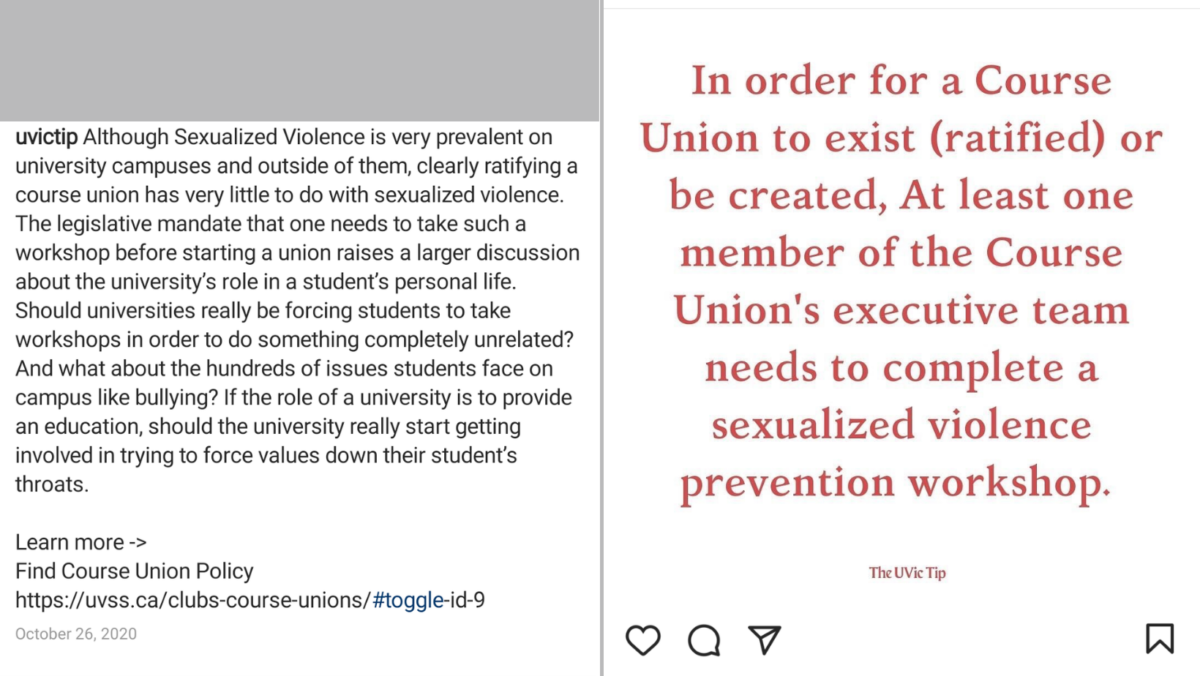Candidates present opposing platforms on key UVSS issues

Two candidates are vying to be the next UVSS director of student affairs. Their platforms and stances on key issues, like advocacy groups and sexualized violence, are very different. Mariel Hernández is currently a director-at-large on the board and Hazam Nasir runs the UVic Tip Instagram page.
In her platform, Hernández emphasizes a need for teamwork on the UVSS board, supporting the sexualized violence policy, and working with advocacy groups to ensure their voices are heard. Nasir wants to create a communication network for students and has previously expressed skepticism on the UVic Tip page about the sexualized violence policy. The policy requires an executive from each club or course union to undergo sexualized violence prevention training. In an interview with the Martlet, Nasir said he would not alter the policy but maintains reservations about it.
Nasir’s other campaign promises include creating announcement videos on Brightspace and holding regular campus-wide events and other debate-style events for students to have dialogues about contentious topics. He is unsure what topics would be included, as they would have to be permissible under the UVSS issues policy. Nasir also plans to create a $2 000 pool of funds by removing $10 from the normal amount allocated to each club to give some clubs a higher budget.
Nasir says he also has “reservations” about advocacy groups having voting seats on the board. However, Nasir indicated he would work with them if elected.
The UVSS advocacy groups each have one voting seat on the UVSS’s 22-person board. Advocacy groups include Pride, the Gender Empowerment Centre, the Society for Students with a Disability (SSD), and the Students of Colour Collective (SOCC). The Native Students Union (NSU) also has a voting seat on the board.
Hernández and Nasir also differ in terms of their approaches to decolonization. Hernández views decolonization as a key part of the UVSS’s values. Although Nasir said he would work with advocacy groups, when repeatedly asked to clarify his position on advocacy groups he indicated that giving Indigenous students preferential treatment for enrollment constitutes discrimination.
“Discriminating in this context means the exact same thing as preferentially allowing Indigenous people inside the University of Victoria, which is what [the university does] in terms of enrollment,” Nasir said. “That is discrimination.”
After the interview, Nasir emailed a statement clarifying his position.
“I wholeheartedly support our advocacy groups and although I have some reservations about giving constituency organizations power within the UVSS governmental structure, as director I will maintain a healthy and positive dialogue with all advocacy groups and support their initiatives,” he said.
Hernández said she is skeptical of her opponent’s ability to work with advocacy groups, given his reservations about their voting seats. She says advocacy groups play an important role in the students’ society.
Hernández pointed out that the NSU’s seat may be the only Indigenous representation on the UVSS board, or at least one of very few Indigenous students on the board.
“We’re in a colonial institution,” Hernández said. “The UVSS has to hold ourselves and also the institution accountable […] I think the UVSS has a wonderful opportunity to centre [advocacy groups’] voices.”
Nasir has shared some of his other opinions on his Instagram page, the UVic Tip. The page features posts about various supports for students on campus.
In one post about the sexualized violence policy, Nasir described how one executive from each club and course union must undergo consent training. This was a new policy brought in by the current Director of Student Affairs Dalal Tubeishat in response to gaps in UVic and UVSS policy that survivors say left them without support.
On UVic Tip, the post took issue with having this training be mandatory for a club executive. At the time of writing, the post was still publicly available on the Instagram account.
“Ratifying a course union has very little to do with sexualized violence,” the post reads, adding that this raises questions about how policy affects “a student’s personal life.”
“If the role is to provide an education, should the university really start getting involved in trying to force values down their students’ throats.”

When asked about this opinion in an interview with the Martlet, Nasir clarified that he would not change the policy if elected.
“Sexualized violence is bad,” he said, saying that he will not change the mandatory training policy if elected. He declined to elaborate further and indicated that this post was not relevant to his campaign. As director of student affairs, Nasir would be directly responsible for this policy.
“Mandating workshops to every single club and course union is going to build some layer of resentment […] because the assumption is that [club and course union executives are people] who are going to sexually abuse someone else,” he said. “That is the implicit assumption.”
In an email after the interview, Nasir clarified his stance and stated that he still has reservations about the policy.
“Sexualized violence is an incredibly challenging issue to combat, approaching fixing the cultural complexities of its causes are immense,” said Nasir in the email. “I do maintain reservations relating to the administrative burden and resentment related issues caused by mandating workshops for every one of our 200 clubs and 30 course unions. I welcome the challenge and will do my best to maintain dialogue with sexualized violence groups on campus to help the fight against sexual violence.”
The other candidate, Hernández, affirmed her support for the sexualized violence training policy. She said she wants to continue lobbying UVic and the province to improve their sexualized violence policy.
The policy necessitating that clubs undergo training was implemented in 2020. Hernández says she has worked directly on the subject in her role as a DaL and maintains that it was an important preventative response to the concerns raised around sexualized violence in clubs in the past.
Overall, she says her opponent’s comments were “shocking.”
“Sexualized violence in student affairs has been really well-documented,” Hernández said. “The university policy can be insufficient […] I think there is a space to question the policy we have in place […] I think undermining it is not the answer.”
“We’re not pushing values down anyone’s throat,” she said.
With files from Michael John Lo.
UVic undergraduate students can vote in UVSS elections for lead directors and on the referendum questions between 9 a.m. on March 24 and 12 p.m. on March 26 at webvote.uvic.ca. All of the directors-at-large were acclaimed.







